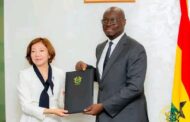The Eastern Regional Chapter of the Ghana Union of Traders Association (GUTA) has disclosed its plans for another crackdown targeting foreign retailers, notably Nigerians, operating in Koforidua, the Eastern Regional capital of Ghana.
Despite previous efforts by GUTA’s task force to address this issue, foreign retailers, particularly of Nigerian origin, continue to proliferate the local retail market, engaging in various businesses that they are not authorized to operate.
Most notably, these foreign retailers are involved in the sale of mobile phones and accessories, and various electronic gadgets.
On Tuesday October 10,2023 Bryt FM spotted Information Service Department’s van on the streets of Koforidua announcing to all foreigners engaged in retail business to close their shops by the end of the week to avert consequences by GUTA.
This announcement comes as a surprise, given a 2021 joint communique signed between Ghana and Nigeria during the Extraordinary ECOWAS Summit.
This agreement exempted Nigerians from the $1 million minimum capital requirement as stipulated by the GIPC Act 2013, Act 865, which had previously barred them from participating in Ghana’s retail market. The exemption was aimed at resolving a 25-year retail dispute between Ghana and Nigeria, and it was officially presented by Ghana’s Speaker of Parliament, Alban Bagbin, to Nigeria’s House of Representatives following the summit.
Speaker Alban Bagbin expressed that this intervention marked the conclusion of the retail impasse between the two nations. He highlighted a reconsideration of the 1-million-dollar minimum requirement for trading enterprises under section 28(2) of the Act. The adjustment was intended to facilitate the regularization of the businesses run by affected Nigerian retail traders who had been previously excluded from the market. Furthermore, a special concession was introduced, reducing the stamp duty requirement to 0.5, with the promise that it would not apply to Nigerian traders.
In response to this new arrangement, GUTA has strongly voiced its opposition and has threatened to resist any amendments to the regulations. The organization’s stance is seemingly driven by concerns regarding competition and the potential effects of foreign retailers on the local market.
This ongoing issue presents a complex challenge, encompassing economic, trade, and diplomatic considerations. It is anticipated that discussions between the government of Ghana, relevant authorities, and GUTA will be necessary to find a balanced solution that addresses concerns while adhering to international agreements and trade protocols.
Source:Mybrytfmonline.com/ Obed Ansah




















































